Modal verbs
- 1. Ėý
- 2. THEY ARE AUXILIARY VERBS THAT PROVIDE ADDITIONAL AND SPECIFIC MEANING TO THE MAIN VERB OF THE SENTENCE. THEY ARE: CAN, COULD, SHOULD, MUST, MAY, MIGHT
- 3. THEY ARE PLACED BETWEEN THE SUBJECT AND THE MAIN VERB EXAMPLE: MARY COULD PLAY THE PIANO S V M
- 4. FEATURES: 1.NO 3RD PERSON ENDINGS. ï HE CANS SKI/HE CAN PLAYS 2.NO DO/DOES/DONÂīT/DOESNÂīT FOR NEGATIVES OR INTERROGATIVES. ï HE DOESNÂīT CAN READ ENGLISH 3.NO INFINITIVES NOR GERUNDS. ï TO MUST/ MUSTING
- 5. 4.THEY ARE FOLLOWED BY INFINITIVES WITHOUT TO SHE MUST DO HOMEWORK 5.THEY DONÂīT HAVE ALL THE TENSES PRESENT: SHE CAN SPEAK FRENCH FUTURE: SHE WILL BE ABLE TO SPEAK CHINESE
- 6. PERMISSION Can I go to the toilet, please? LESS FORMAL Could you please tell me the time? May I see your passport, sir? ABILITY She can play the piano ( in the present) She could play the piano (in the past) MORE FORMAL
- 7. OBLIGATION You must be at home at 12 oÂīclock PROHIBITION You mustnÂīt smoke here POSSIBILITY The roads can/may/might/could be blocked by the snow
- 8. IMPOSSIBILITY She canÂīt be your mum because sheÂīs only 22 years old. ADVISE You should stop smoking You shouldnÂīt eat so much fat CERTAINTY Look at his poor clothes! He must be a beggar.







